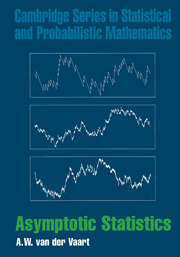Book contents
- Frontmatter
- Dedication
- Contents
- Preface
- Notation
- 1 Introduction
- 2 Stochastic Convergence
- 3 Delta Method
- 4 Moment Estimators
- 5 M–and Z-Estimators
- 6 Contiguity
- 7 Local Asymptotic Normality
- 8 Efficiency of Estimators
- 9 Limits of Experiments
- 10 Bayes Procedures
- 11 Projections
- 12 U -Statistics
- 13 Rank, Sign, and Permutation Statistics
- 14 Relative Efficiency of Tests
- 15 Efficiency of Tests
- 16 Likelihood Ratio Tests
- 17 Chi-Square Tests
- 18 Stochastic Convergence in Metric Spaces
- 19 Empirical Processes
- 20 Functional Delta Method
- 21 Quantiles and Order Statistics
- 22 L-Statistics
- 23 Bootstrap
- 24 Nonparametric Density Estimation
- 25 Semiparametric Models
- References
- Index
24 - Nonparametric Density Estimation
Published online by Cambridge University Press: 05 June 2012
- Frontmatter
- Dedication
- Contents
- Preface
- Notation
- 1 Introduction
- 2 Stochastic Convergence
- 3 Delta Method
- 4 Moment Estimators
- 5 M–and Z-Estimators
- 6 Contiguity
- 7 Local Asymptotic Normality
- 8 Efficiency of Estimators
- 9 Limits of Experiments
- 10 Bayes Procedures
- 11 Projections
- 12 U -Statistics
- 13 Rank, Sign, and Permutation Statistics
- 14 Relative Efficiency of Tests
- 15 Efficiency of Tests
- 16 Likelihood Ratio Tests
- 17 Chi-Square Tests
- 18 Stochastic Convergence in Metric Spaces
- 19 Empirical Processes
- 20 Functional Delta Method
- 21 Quantiles and Order Statistics
- 22 L-Statistics
- 23 Bootstrap
- 24 Nonparametric Density Estimation
- 25 Semiparametric Models
- References
- Index
Summary
This chapter is an introduction to estimating densities if the underlying density of a sample of observations is considered completely unknown, up to existence of derivatives. We derive rates of convergence for the mean square error of kernel estimators and show that these cannot be improved. We also consider regularization by monotonicity.
Introduction
Statistical models are called parametric models if they are described by a Euclidean parameter (in a nice way). For instance, the binomial model is described by a single parameter p, and the normal model is given through two unknowns: the mean and the variance of the observations. In many situations there is insufficient motivation for using a particular parametric model, such as a normal model. An alternative at the other end of the scale is a non parametric model, which leaves the underlying distribution of the observations essentially free. In this chapter we discuss one example of a problem of nonparametric estimation: estimating the density of a sample of observations if nothing is known a priori. From the many methods for this problem, we present two: kernel estimation and monotone estimation. Notwithstanding its simplicity, this method can be fully asymptotically efficient.
Kernel Estimators
The most popular nonparametric estimator of a distribution based on a sample of observations is the empirical distribution, whose properties are discussed at length in Chapter 19. This is a discrete probability distribution and possesses no density. The most popular method of nonparametric density estimation, the kernel method, can be viewed as a recipe to “smooth out” the pointmasses of sizes in order to tum the empirical distribution into a continuous distribution.
Let be a random sample from a density f on the real line. If we would know that f belongs to the normal family of densities, then the natural estimate of f would be the normal density with mean and variance or the function
In this section we suppose that we have no prior knowledge of the form of f and want to “let the data speak as much as possible for themselves.“
Let K be a probability density with mean 0 and variance 1, for instance the standard normal density.
- Type
- Chapter
- Information
- Asymptotic Statistics , pp. 341 - 357Publisher: Cambridge University PressPrint publication year: 1998



